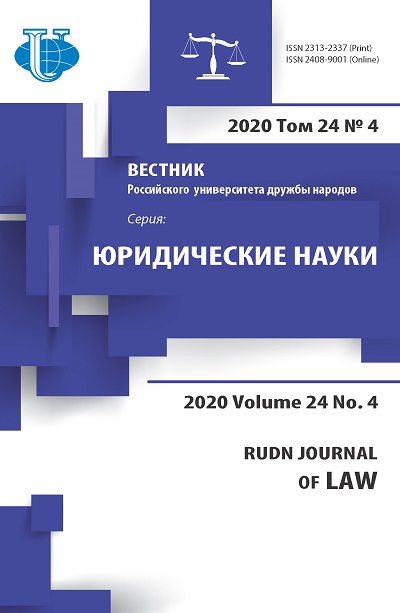FEDERAL PATENT COURT OF GERMANY AS AN INSTITUTE FOR THE PROTECTION OF PATENT RIGHTS
- Authors: Kirilova K.V.1
-
Affiliations:
- Peoples’ Friendship University of Russia (RUDN University)
- Issue: Vol 24, No 4 (2020)
- Pages: 1024-1038
- Section: CIVIL LAW
- URL: https://journals.rudn.ru/law/article/view/25251
- DOI: https://doi.org/10.22363/2313-2337-2020-24-4-1024-1038
- ID: 25251
Cite item
Full Text
Abstract
The establishment of the Institute for the protection of patent rights, namely the establishment of the Federal patent court of Germany, has passed a rather difficult historical path. Interest to “protection of patent rights” was first identified in 1877, and that year the “Patent law” came into force; it is still relevant with a new version dated December 16, 1980. The German Federal patent court was established on 1 July 1961 as an independent Federal court. Strife for its establishment was conducted for a long time; it was accompanied by the need to introduce qualified specialists into that system, so called technical judges. The relevance lies in the borrowing of the German model of organization and functioning of the Federal patent court of the Federal Republic of Germany by other States to regulate the work of such a body in the judicial system of the country. The purpose of this article is to study the Institute for intellectual property protection in Germany. The author pays attention to the place and role of the Federal patent court of Germany in the German judicial system, as well as examines the legal regulation of the activities, structure and formation of the Federal patent court of Germany. The methodology of the research consists of the General scientific dialectical method of cognition and the methods that stem from it: systemic, logical, special-legal and statistical. In conclusion, the author of the study argues that today the most effective tool in ensuring and restoring violated intellectual rights is judicial protection, because the process of reviewing complaints in court contributes to finding objective solution to the dispute and allows restore the violated rights.
About the authors
Karina V. Kirilova
Peoples’ Friendship University of Russia (RUDN University)
Author for correspondence.
Email: kirilova_kv@pfur.ru
postgraduate student of the Department of judicial power, law enforcement and human rights activities
6 Miklukho-Maklaya str., Moscow, 117198, Russia FederationReferences
- Ann, C. (2009) Verletzungsgerichtsbarkeit zentral für jedes Patentsystem und doch häufigunterschätzt. GRUR — Gewerblicher Rechtsschutz und Urheberrecht. (111). (in Germany).
- Cremers, K., Gaessler, F., Harhoff, D., Helmers, C. (2014) Invalid but infringed? An analysis of Germany's bifurcated patent litigation system, ZEW Discussion Papers, No. 14-072, Zentrum für Europäische Wirtschaftsforschung, ZEW Mannheim, available at: http://nbnresolving.de/urn:nbn:de:bsz:180-madoc-371514 (Accessed 25 July 2020).
- Dzhakupov, Zh.A. (2012) O formirovanii suda po intellektual'nym pravam v Rossiiskoi Federacii [Formation of the intellectual property rights court in the Russian Federation]. Legal world. (5), 37–42. (in Russian).
- Kosovskaya, I.I., Shipika, L.V. (2019) Legislative innovations of 2019 in the field of dispute resolution on the protection and protection of intellectual property rights. Law and state: theory and practice. 7 (175), 95–97 (in Russian).
- Ku¨hnen, T., Claessen, R. (2013) Die Durchsetzung von Patenten in der EU—Standortbestimmung vor Einfu¨hrung des Europa¨ischen Patentgerichts. GRUR. 115(6), 592–596. (in Germany).
- Matvienko, D.V. (2012) O sisteme sudov, rassmatrivayushchih dela po intellektual’noj sobstvennosti v Rossii I Germanii [On the system of courts dealing with intellectual property cases in Russia and Germany]. Bulletin of the Saratov state law Academy. 3 (86), 154–159. (in Russian).
- Mazaev, D.V. (2010). Sud po intellectual’nym pravam: novoe reshenie staroj problem [The court for intellectual property rights: a new solution to an old problem]. Bulletin of The Academy of economic security of the Ministry of internal Affairs of Russia. (10), 117–120. (in Russian).
- Moss, G., Jones, M., Lundie-Smith, R. (2010) Just how ‘anti-patent’ are the UK courts? Journal of Intellectual Property Law & Practice. 5(3), 148–157.
- Mejer, M., Van Pottelsberghe de la Potterie, B. (2012) Economic incongruities in the European patent system. European journal of law and economics. 34(1), 215–234.
- Mihailov, S.M., Mihailov, L. (2015) Having special knowledge as a guarantee of independence of judges of the Intellectual Property Court. Actual problems of Russian law. (5), 173–176. (in Russian).
- Mingaleva, Zh.A., Loginova, T.E. (2012) Opyt pravovogo regulirovaniya ob"ektov intellektual'noi sobstvennosti i innovacionnoj deyatel'nosti (na primere Germanii) [Experience in legal regulation of intellectual property and innovation (for example, Germany)]. Bulletin of Perm University. Legal science. 1 (15), 139–148. (in Russian).
- Pakuschert, E.K. (1986) German patent procedure. Patent procedure in the Federal Republic of Germany. International tax and business lawyer. 4, 86–104.
- Reinganum, J. F., Wilde, L. L. (1986) Settlement, litigation, and the allocation of litigation costs. Rand Journal of Economics. 17(4), 557–566.
- Russlis, S., Tkachev, D. (2013) Obshchie aspekty sudoproizvodstva v sfere zashchity intellektual'noi sobstvennosti v Germanii [General aspects of legal proceedings in the field of intellectual property protection in Germany]. Journal of the intellectual property rights court. (1), 42–46. (in Russian).
- Ruzakova, O.A. (2017) Aktual'nye problemy razvitiya zakonodatel'stva ob intellektual'noi sobstvennosti [Current problems of development of intellectual property legislation]. Property relations in the Russian Federation. (3), 19–26. (in Russian).
- Syshchikova, T.M., Shabanov, P.N. (2014) Federal patent court of the Federal Republic of Germany: organization and activities questions. Legal science and legal education reform. 4 (27), 53–57. (in Russian).
- William, T.S. (1959) The legal system of the Federal Republic of Germany. Hastings law journal. 11 (1), 7–22.
Supplementary files















